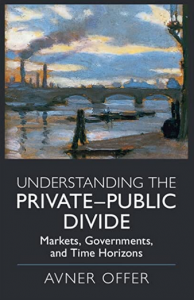Avner Offer’s new, shortish book Understanding the Private-Public Divide: Markets, Governments and Time Horizons is superb. It sets out a persuasive argument for locating the boundary between private and public production in terms of the payback period for investment. The book starts: “In economics… the present is all there is. Past costs are sunk and can be ignored. The future is only what we make of it today.” What if we take seriously the need to invest for the future? As he points out, government accounts for 30-40% of GDP in most rich countries, and when you add in non-profit and household production well under half of economic welfare is produced on a for-profit basis – and that couldn’t happen without government-provided infrastructure or other support such as franchises or patents.
The central point is that for-profit investment needs to pay off in a relatively short period: “The higher the rate, the shorter the wait.” The prevailing interest rate defines a unique break-even period. Private markets can produce efficiently if the pay-off period is shorter. Otherwise, government has to act as the “commitment agent for society.” When it steps back from this, delegating to private agents, corruption is often the result, or else the enrichment of managers and shareholders at the expense of workers and consumers. There are no grounds for expecting efficiency gains – quite the contrary.
Offer writes: “There is no warrant for extending market norms to the rest of social activity, to the family, government, infrastructure, education, healthcare, science and arts, social insurance, old age, defence, protecting the environment and climate. Together, these are the source of most economic welfare.” He adds, for good measure, that much financial sector activity serves no social purpose.
Stirring stuff. The chapters set out the basic economic argument about credit time horizons, and then discuss the ethical and political consequences of governments delegating long-term activities to the private sector. Subsequent chapters discuss specific issues – housing and climate change.
When you add to the mix the well-known Herbert Simon point (in his 1991 Journal of Economic Perspectives article Organizations and Markets: “The economies of modern industrialized society can more appropriately be labeled organizational economies than market economies.”) about the limited scope of the market within private enterprises, it seems hard to understand how we’ve been through the past 40 years of markets-first political philosophy and practice.
Avner Offer has delivered a bracing counterblast to this. His main omission is non-market, non-government economic activity, civil society and the household (hence my book was Markets, State and People). But that would have been a different book. Highly recommended.

